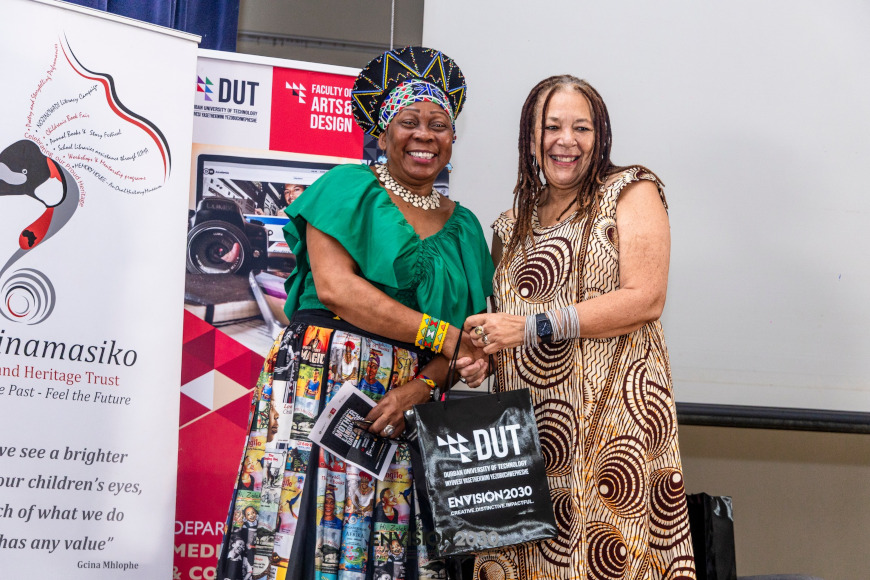“Speak your mother tongue with love and pride,” encouraged DUT’s 2024 Honorary Doctorate recipient Dr Gcina Mhlophe, during her speech at the 25th anniversary of International Mother Language Day.
A world-renowned South African storyteller, author, poet, playwright, activist and actress, Dr Mhlophe shared her inspiring words at the event, which took place on Friday, 21 February 2025, at the Arthur Smith Hall on DUT’s City campus in Durban. The celebration, organised by the Media, Language and Communication Department in the Faculty of Arts and Design, in collaboration with Dr Mhlophe’s Gcinamasiko Arts and Heritage Trust, centred around the theme “Make Languages Count for Sustainable Development.” The programme was a vibrant mix of poetry, music, exhibitions and panel discussions, all emphasising the crucial role of first languages in driving sustainable development.
The vibrant Dr Mhlophe engaged the audience with her renowned storytelling and folk music. She stressed the deep connection between language and identity, encouraging academics to continue nurturing young minds and to remember the impact of their work on the nation’s future. Dr Mhlophe also emphasized the importance of academic curiosity, urging students to embrace their role in building a stronger, more inclusive society.
She further encouraged the DUT students to learn to speak and understand their mother language, to arm themselves for a better future. She criticised parents who boasts about their children not being able to speak their mother tongue.
“You will get a parent who will tell you that her child does not speak isiZulu. We are proud that our children do not speak our language. Some would say this mentality came with freedom but what kind of freedom would allow us to forget who we are and where we come from?” remarked Dr Mhlophe
Speaking on the importance of mother language in society, Professor Jean Baxen, the Interim Executive Dean of the Faculty of Arts and Design at DUT, reflected on the historical privilege of certain languages before South Africa’s democratic shift in 1994, and the evolution of language policies at DUT and in the country.
“While we have made significant progress, we still have a long way to go,” said Prof Baxen, emphasizing the need for continued inclusivity and recognition of all South African languages. She celebrated the addition of South Africa’s 12th official language, South African Sign Language and acknowledged the crucial role of sign language interpreters in fostering inclusivity.
Mr Jabulani Simelane, Director of the Pan South African Languages Board (PanSALB), expressed his message of support to DUT, commending its efforts and the broader national commitment to promoting indigenous languages. He emphasized the importance of the Basic Education Laws Amendment Act (Bela Bill) and its role in ensuring equal access to education in students’ mother tongues. Simelane highlighted the challenges faced by students in regions like northern KwaZulu-Natal, where learners struggle with language barriers, further underscoring the need for language policies that support inclusivity.
The event also showcased the talent of Musa “The Dark Knight” Zondo, a DUT Journalism student from the Eastern Cape and an isiXhosa first-language speaker. He captivated the audience with his powerful storytelling and poetry. Zondo’s performance, accompanied by music, recognised the heroes and heroines of the Bantu language groups, highlighting the strength of indigenous languages in connecting South Africans to their rich cultural heritage.
A panel discussion moderated by DUT Journalism lecturer Mr Siphumelele Zondi also representing addressed the question: “Are we seeing improved usage of mother tongues in the arts, academia, and society after 25 years of International Mother Tongue Day?” Panelists, including Professor Nobuhle Hlongwa (Dean and Head of the School of Arts, UKZN) and Ms Pinky Radebe (Head of Communications, KZN Tourism & Film Authority), discussed the continued sidelining of indigenous languages in South African universities. However, Prof Hlongwa acknowledged progress with recent initiatives, such as the publication of academic papers in isiZulu by local universities.
Speaking to the students, Radebe emphasized the importance of them knowing to express themselves in their mother language, especially in the workplace in order to communicate effectively with others. She indicated that some workplace would require them to be able to speak their mother language to be able to communicate with all stakeholders.
Professor Monwabisi Ralarala, Deputy Vice-Chancellor: Academic at the University of Western Cape captivated the audience with his thought-provoking presentation on how institutions of higher learning can promote a culture of multilingualism and linguistic diversity in South Africa. He acknowledged the current work being done by universities but pointed out that all universities still have a long way to go in embracing mother languages in their institutions.
DUT’s International Mother Tongue Day celebration successfully highlighted the ongoing challenges and achievements in the preservation and promotion of indigenous languages. The event not only celebrated cultural heritage but also encouraged continued dialogue and action towards a future where all languages are valued equally.
The celebration continued with a community engagement event at the Bluff Showgrounds under the Story Telling Tree on Saturday, 22 February 2025, where attendees participated in further discussions, performances, and storytelling activities, all vowing to preserve their mother languages.
Pictured: Dr Gcina Mhlophe and Professor Jean Baxen, Interim Executive Dean of the Faculty of Arts and Design at DUT commemorating International Mother Language Day.
Photographer: S’bonelo Dlamini.
Simangele Zuma/Nkosingiphile Dladla

